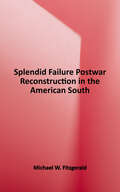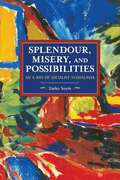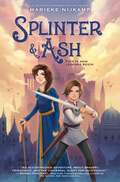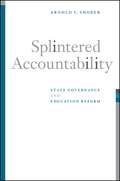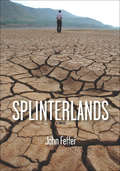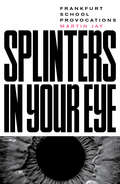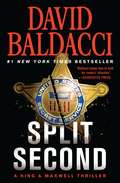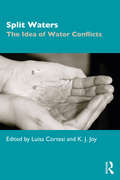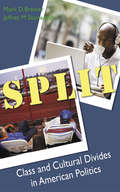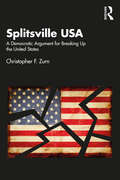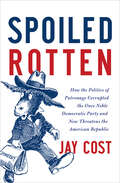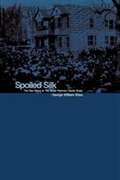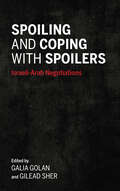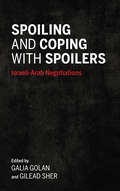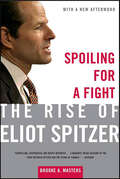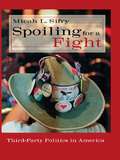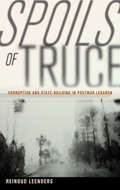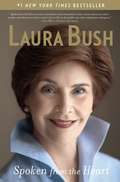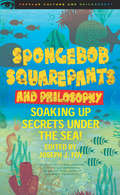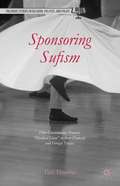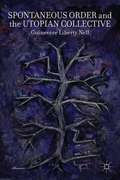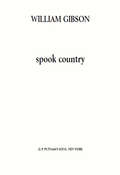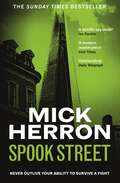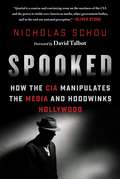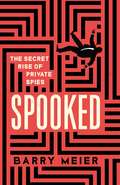- Table View
- List View
Splendid Failure: Postwar Reconstruction in the American South (American Ways Ser.)
by Michael W. FitzgeraldSince the civil rights era of the 1960s, revisionist historians have been sympathetic to the racial justice motivations of the Radical Republican Reconstruction policies that followed the Civil War. But this emphasis on positive goals and accomplishments has obscured the role of the Republicans in the overthrow of their own program. Rich with insight, Michael W. Fitzgerald's new interpretation of Reconstruction shows how the internal dynamics of this first freedom movement played into the hands of white racist reactionaries in the South. Splendid Failure recounts how postwar financial missteps and other governance problems quickly soured idealistic Northerners on the practical consequences of the Radical Republican plan, and set the stage for the explosion that swept Southern Republicans from power and resulted in Northern acquiescence to the bloody repression of voting rights. The failed strategy offers a chastening example to present-day proponents of racial equality.
Splendour, Misery, and Possibilities: An X-Ray of Socialist Yugoslavia
by Darko SuvinThe Socialist Federal Republic of Yugoslavia was created in a surge of revolutionary self-determination that rejected both the free-market-Capitalism of Europe, and the bureaucratic-Socialism of the Soviet Union. Yet this early experimentation and dynamism ultimately gave way to the same sclerotic state-system its creators were trying to avoid. In this engaging treatise, Suvin seeks out the source of this failure.
Splinter & Ash (Splinter & Ash #1)
by Marieke Nijkamp“An essential middle grade fantasy where all readers will find heroes to love and to cheer!” —Alex London, author of Battle Dragons and The Princess Protection Program“Every kid deserves to see themselves as princesses or knights or whatever role they wish to play, and Nijkamp carves out the space for them to do so. Thoughtful, inclusive, and an outright joy, Splinter & Ash shines; a new classic that belongs on the shelves of every fantasy reader.” —Nicole Melleby, author of Hurricane Season and coeditor of This Is Our Rainbow“Splinter & Ash is a rare gem: a shining example of a fantasy novel that will engage readers of any age.” —A. J. Sass, award-winning author of Ellen Outside the Lines and Ana on the EdgeNew York Times bestselling author Marieke Nijkamp's middle grade prose debut is an immersive medieval fantasy starring queer and disabled young heroes. For two young misfits, a dangerous quest to save their kingdom will also mean saving each other. For fans of B. B. Alston’s Amari and the Night Brothers, Soman Chainani’s School for Good and Evil, and Tamora Pierce’s Tortall books.Ash—or Princess Adelisa—is the youngest child of the queen, recently returned to the city of Kestrel’s Haven after spending six years on the other side of the country. Ash was hoping for a joyous reunion, but the reality is far from it. Her mother is holding the kingdom together by a thread; her brother has only taunts and jibes for her; and court is full of nobles who openly mock and dismiss Ash, who uses a cane and needs braces to strengthen her joints.Splinter is the youngest child of one of Haven’s most prominent families. She’s fierce, determined, and adventurous, and she has her sights set on becoming a knight just like her older brother. Even if everyone says she can’t because she’s not a boy. So what? She’s not a girl, either.A chance encounter throws Ash and Splinter into each other’s orbits and changes the course of the kingdom's history. The princess and her new squire will face bullies, snobs, gossips, and their own disapproving families. But when they uncover a shadowy group of nobles plotting to overthrow the queen, they will show everyone how legends are born. Together.The first in a trilogy, bestselling author Marieke Nijkamp’s medieval fantasy is an action-packed love letter to nonbinary, queer, and disabled kids. Splinter & Ash evokes the classic adventure and atmosphere of fantasies by Lloyd Alexander and Tamora Pierce and the fresh, inclusive lens of writers such as Rick Riordan, Angie Thomas, and Soman Chainani. It invites everyone—no matter who they are or what they look like—to fight for what they believe in.
Splintered Accountability: State Governance and Education Reform (SUNY series in Public Policy)
by Arnold F ShoberThe No Child Left Behind Act declared that improving education in every school in the United States was a top national priority. However, this act did not acknowledge how state departments of education have successfully constructed reforms for the past few decades, despite the power struggle between governors, legislators, school districts, and state boards of education. Drawing upon archival sources, state budget documents, interviews, and statistical analysis, Splintered Accountability amply demonstrates that sustained education reform is best left in the hands of the relatively autonomous state departments of education in order to maintain curriculum standards, school finance, and teacher licensure systems. Comprehensive and successful education reform originates from within state education agencies, propelled by savvy state superintendents.Arnold F. Shober is Assistant Professor of Government at Lawrence University.
Splinterlands: A Novel (Splinterlands #1)
by John FefferPart Field Notes from a Catastrophe, part 1984, part World War Z, John Feffer's striking new dystopian novel, takes us deep into the battered, shattered world of 2050. The European Union has broken apart. Multiethnic great powers like Russia and China have shriveled. America's global military footprint has virtually disappeared and the United States remains united in name only. Nationalism has proven the century's most enduring force as ever-rising global temperatures have supercharged each-against-all competition and conflict among the now 300-plus members of an increasingly feeble United Nations.As he navigates the world of 2050, Julian West offers a roadmap for the path we're already on, a chronicle of impending disaster, and a faint light of hope. He may be humanity's last best chance to explain how the world unraveled-if he can survive the savage beauty of the Splinterlands.John Feffer is the director of Foreign Policy in Focus at the Institute for Policy Studies. In 2012-2013, he was also an Open Society Fellow looking at the transformations that have taken place in Eastern Europe since 1989. He is the author of several books and numerous articles. He has also produced six plays, including three one-man shows, and published a novel.
Splinters in Your Eye: Essays on the Frankfurt School
by Martin JayAssessing the legacy of the Frankfurt School in the twenty-first centuryAlthough successive generations of the Frankfurt School have attempted to adapt Critical Theory to new circumstances, the work done by its founding members continues in the 21st century to unsettle conventional wisdom about culture, society and politics. Exploring unexamined episodes in the School's history and reading its work in unexpected ways, these essays provide ample evidence of the abiding relevance of Horkheimer, Adorno, Benjamin, Marcuse, Löwenthal, and Kracauer in our troubled times. Without forcing a unified argument, they range over a wide variety of topics, from the uncertain founding of the School to its mixed reception of psychoanalysis, from Benjamin's ruminations on stamp collecting to the ironies in the reception of Marcuse's One-Dimensional Man, from Löwenthal's role in Weimar's Jewish Renaissance to Horkheimer's involvement in the writing of the first history of the Frankfurt School. Of special note are their responses to visual issues such as the emancipation of color in modern art, the Jewish prohibition on images, the relationship between cinema and the public sphere, and the implications of a celebrated Family of Man photographic exhibition. The collection ends with two essays tracing the still metastasizing demonization of the Frankfurt School by the so-called Alt Right as the source of "cultural Marxism" and "political correctness," which has gained alarming international resonance and led to violence by radical right-wing fanatics.
Split Second (King & Maxwell Series #1)
by David BaldacciTwo Secret Service agents sworn to guard their protectees lost them in a single moment . . . and in this #1 New York Times bestseller, they're about to learn that the violence has just begun.Michelle Maxwell has just wrecked her promising career at the Secret Service. Against her instincts, she let a presidential candidate out of her sight for the briefest moment and the man whose safety was her responsibility vanished into thin air.Sean King knows how the younger agent feels. Eight years earlier, the hard-charging Secret Service agent allowed his attention to be diverted for a split second. And the candidate he was protecting was gunned down before his eyes. Now Michelle and Sean are about to see their destinies converge.Drawn into a maze of lies, secrets, and deadly coincidences, the two discredited agents uncover a shocking truth: that the separate acts of violence that shattered their lives were really a long time in the making—and are a long way from over.
Split Waters: The Idea of Water Conflicts
by K. J. Joy Luisa CortesiLimited, finite, contaminated, unavailable or expensive, water divides people all around the globe. We all cannot do without water for long, but can for long enough to fight for it. This commonsensical narration of water conflicts, however, follows a pattern of scarcity and necessity that is remarkably unvaried despite different social and geographical contexts. Through in-depth case studies from around the globe, this volume investigates this similarity of narration—confronting the power of a single story by taking it seriously instead of dismissing it. In so doing, it invites the reader to rethink water conflicts and how they are commonly understood and managed. This book: Posits the existence of the idea of water conflict, and asks what it is and what it produces, thus how it is used to pursue particular interests and to legitimise specific historical, technological and environmental relations; Examines the meaning and power of ideas as compared to other categories of knowledge, advancing theoretical frameworks related to environmental knowledge, discursive power, social constructivism; Presents an alternative agenda to deepen the conversation around water conflicts among scholars and activists. Of interest to scholars and activists alike, this volume is addressed to those involved with environmental conflicts, environmental knowledge and justice, disasters and climate change from the disciplinary angles of environmental anthropology and sociology, political ecology and economy, science and technology studies, human geography and environmental sciences, development and cooperation, public policy and peace studies. Essays by Gina Bloodworth, Ben Bowles, Patrick Bresnihan, Luisa Cortesi, Mattia Grandi, K. J. Joy, Midori Kawabe, Adrianne Kroepsch, Vera Lazzaretti, Leslie Mabon, Renata Moreno Quintero, Madhu Ramnath, Jayaprakash Rao Polsani, Dik Roth, Theresa Selfa,Veronica Strang, Mieke van Hemert, Jeroen Warner, Madelinde Winnubst.
Split: Class and Cultural Divides in American Politics
by Jeffrey M. Stonecash Dr Mark BrewerTalk of politics in the United States today is abuzz with warring red and blue factions. The message is that Americans are split due to deeply-held beliefs—over abortion, gay marriage, stem-cell research, prayer in public schools. Is this cultural divide a myth, the product of elite partisans? Or is the split real?Yes, argue authors Mark Brewer and Jeffrey Stonecash—the cultural divisions are real. Yet they tell only half the story. Differences in income and economic opportunity also fuel division—a split along class lines. Cultural issues have not displaced class issues, as many believe. Split shows that both divisions coexist meaning that levels of taxation and the quality of healthcare matter just as much as the debate over the right to life versus the right to choose.The authors offer balanced, objective analysis, complete with a wealth of data-rich figures and tables, to explain the social trends underlying these class and cultural divides and then explore the response of the parties and voters. Offering solid empirical evidence, the authors show that how politicians, the media, and interest groups perceive citizen preferences—be they cultural or class based—determines whether or not the public gets what it wants. Simply put, each set of issues creates political conflict and debate that produce very different policies and laws. With a lively and highly readable narrative, students at every level will appreciate the brevity and punch of Split and come away with a more nuanced understanding of the divisions that drive the current American polity.
Splitsville USA: A Democratic Argument for Breaking Up the United States
by Christopher F. ZurnSplitsville USA argues that it’s time for us to break up to save representative democracy, proposing a mutually negotiated, peaceful dissolution of the current United States of America into several new nations. Zurn begins by examining the United States’ democratic predicament, a road most likely headed for electoral authoritarianism, with distinct possibilities of ungovernability and violent civil strife. Unlike others who share this diagnosis, Zurn presents a realistic picture of how we can get to reform and what it would involve. It is argued that "Splitsville" represents the most plausible way for American citizens to continue living under a republican form of government. Despite recent talk of secession and civil war, this book offers the most extensive treatment yet of the issues we need to think through to enable a peacefully negotiated political divorce. Splitsville USA is a provocative conversation opener about the problems that have gotten us into our current political pickle and how to get out of it by seizing the reins of our own constitutional destiny. The book will appeal to readers of political science, American politics, history, political philosophy, and law, along with all general readers interested in the future of democracy in the United States.
Spoiled Rotten: How the Politics of Patronage Corrupted the Once Noble Democratic Party and Now Threatens the American Republic
by Jay CostA popular columnist for The Weekly Standard, conservative journalist Jay Cost now offers a lively, candid, diligently researched revisionist history of the Democratic Party. In Spoiled Rotten, Cost reveals that the national political organization, first formed by Andrew Jackson in 1824, that has always prided itself as the party of the poor, the working class, the little guy is anything but that—rather, it’s a corrupt tool of special interest groups that feed off of the federal government. A remarkable book that belongs on every politically aware American’s bookshelf next to Jonah Goldberg’s Liberal Fascism and The Forgotten Man by Amity Shlaes, Spoiled Rotten exposes the Democratic Party as a modern-day national Tammany Hall and indisputably demonstrates why it can no longer be trusted with the power of government.
Spoiled Silk: The Red Mayor and the Great Paterson Textile Strike
by George William SheaSpoiled Silk is the story of two immigrants from the Rhineland, William Brueckmann and his wife Katherine, who started a new life in America's first industrial city, Paterson NJ, nourishing a vision of their adopted country that was never to be. Committed to a socialist dream, they struggled to improve the lot of their fellow immigrants and, at the same time, to raise a family in the midst of the turbulence that surrounded them. Their efforts contributed in the long run to improved working conditions in American mills, but their dream of a socialist America was never to be realized. It was in 1913 that the workers in the Paterson textile mills, having learned that a new kind of loom would put many of them out of work went on strike against the mill owners. In desperation, they called in Big Bill Haywood and the Wobblies of the I. W. W. to help them. The Paterson authorities moved quickly to crush the strike by forbidding the strikers to hold public meetings. Alone among elected local officials, William Brueckmann, Mayor of the neighboring town of Haledon, defied the Paterson authorities and their police department and upheld the constitutional rights of the strikers by giving them a safe haven in his town. His action marked the beginning of a long and bitter struggle that brought thousands of workers to the open fields of Haledon and forced the city of Paterson to its knees. The strike is an important chapter in the history of the American labor movement. For William and Katherine Brueckmann it did not however, mark the end of their struggles. Spoiled Silk also chronicles the prejudice they had to face during the First World War and the pressures that eventually drove them to compromise with post-war America and its Good Times. It was a compromise that would bring with it a different kind of tragedy and sorrow, the death of an only son and their own drawing apart from one another. The recent interest in immigrants to America has almost overlooked the largest group of immigrants, the German Americans. Spoiled Silk is a moving story about two of them. Vividly told by their grandson, who draws upon a reservoir of family stories as well as official sources, Spoiled Silk brings to life the experiences of these valiant people in the early decades of the century just past.
Spoiling and Coping with Spoilers: Israeli-Arab Negotiations (Indiana Series In Middle East Studies)
by Edited by Galia Golan and Gilead SherEssays analyzing the role of those who damage or work to damage peace negotiations, specifically in connection to the Israeli-Arab conflict.For as long as people have been working to bring peace to areas suffering long-standing, violent conflict, there have also been those working to spoil this peace. These “spoilers” work to disrupt the peace process, and often this disruption takes the form of violence on a catastrophic level. Galia Golan and Gilead Sher offer a broader perspective. They examine this phenomenon by analyzing groups who have spoiled or attempted to spoil peace efforts by political or other nonviolent means. By focusing in particular on the Israeli-Arab conflict, this collection of essays considers the impact of a democratic society operating within a broader context of violence. Contributors bring to light the surprising efforts of negotiators, members of the media, political leaders, and even the courts to disrupt the peace process, and they offer coping strategies for addressing this kind of disruption. Taking into account the multitude of factors that can lead to the breakdown of negotiations, Spoiling and Coping with Spoilers shows how spoilers have been a key factor in Israeli-Arab negotiations in the past and explores how they will likely shape negotiations in the future.“Overall, Spoiling and Coping with Spoilers offers a refreshing approach to understanding the Israeli-Arab conflict and peace process. By examining the role of spoiling and spoilers, it engages the reader in questions about the potential for and challenges to peace in the region. . . . Highly recommended.” —Choice
Spoiling and Coping with Spoilers: Israeli-Arab Negotiations (Indiana Series in Middle East Studies)
by Edited by Galia Golan Gilead SherFor as long as people have been working to bring peace to areas suffering long-standing, violent conflict, there have also been those working to spoil this peace. These "spoilers" work to disrupt the peace process, and often this disruption takes the form of violence on a catastrophic level. Galia Golan and Gilead Sher offer a broader perspective. They examine this phenomenon by analyzing groups who have spoiled or attempted to spoil peace efforts by political or other nonviolent means. By focusing in particular on the Israeli-Arab conflict, this collection of essays considers the impact of a democratic society operating within a broader context of violence. Contributors bring to light the surprising efforts of negotiators, members of the media, political leaders, and even the courts to disrupt the peace process, and they offer coping strategies for addressing this kind of disruption. Taking into account the multitude of factors that can lead to the breakdown of negotiations, Spoiling and Coping with Spoilers shows how spoilers have been a key factor in Israeli-Arab negotiations in the past and explores how they will likely shape negotiations in the future.
Spoiling for a Fight: The Rise of Eliot Spitzer
by Brooke A. MastersThe rise to power of Eliot Spitzer, the scourge of Wall Street and one of America's most controversial politicians, by the reporter who knows his crusade bestFew politicians have burst onto the American scene with as much impact as Eliot Spitzer. He has exposed wrongdoing by stock analysts, mutual fund managers, and insurance brokers, and he has investigated corporations that have misled or defrauded investors and consumers. When federal regulators have fallen down on their responsibilities, Spitzer has stepped in to protect ordinary, middle-class Americans. His actions as the New York State attorney general have made companies change the way they do business, which in turn affects every American with a retirement plan, an insurance policy, or a prescription to fill. No reporter has had better or more complete behind-the-scenes access to Spitzer's operation—and to the strategies that have underpinned his crusade against these powerful forces in the American economy—than Brooke A. Masters of The Washington Post. In Spoiling for a Fight, she presents a portrait that is at once dramatic and revealing, raising the question of whether Spitzer's way of conducting government business is good or bad for America.Combining passion and zeal with a savvy understanding of the press, Spitzer has brought down some of the biggest names in American finance and now has his sights set on higher office. This revelatory book shows Americans how Spitzer has transformed their lives and what his crusade could mean for the future.
Spoiling for a Fight: Third-Party Politics in America
by Micah L. SifryMore Americans now identify as political independents than as either Democrats or Republicans. Tired of the two-party gridlock, the pandering, and the lack of vision, they've turned in increasing numbers to independent and third-party candidates. In 1998, for the first time in decades, a third-party candidate who was not a refugee from one of the two major parties, Jesse Ventura, won election to state-wide office, as the governor of Minnesota. In 2000, the public was riveted by the Reform Party's implosion over Patrick Buchanan's presidential candidacy and by Ralph Nader's Green Party run, which infuriated many Democrats but energized hundreds of thousands of disaffected voters in stadium-sized super-rallies.What are the prospects for new third-party efforts? Combining the close-in, personal reporting and learned analysis one can only get by covering this beat for years, Micah L. Sifry's. Spoiling for a Fight exposes both the unfair obstacles and the viable opportunities facing today's leading independent parties. Third-party candidates continue be denied a fighting chance by discriminatory ballot access, unequal campaign financing, winner-take-all races, and derisive media coverage. Yet, after years of grassroots organizing, third parties are making major inroads. At the local level, efforts like Chicago's New Party and New York's Working Families Party have upset urban political machines while gaining positions on county councils and school boards. Third-party activists are true believers in democracy, and if America's closed two-party system is ever to be reformed, it will be thanks to their efforts
Spoils of Truce: Corruption and State-Building in Postwar Lebanon
by Reinoud LeendersIn Spoils of Truce, Reinoud Leenders documents the extensive corruption that accompanied the reconstruction of Lebanon after the end of a decade and a half of civil war. With the signing of the Ta'if peace accord in 1989, the rebuilding of the country's shattered physical infrastructure and the establishment of a functioning state apparatus became critical demands. Despite the urgent needs of its citizens, however, graft was rampant. Leenders describes the extent and nature of this corruption in key sectors of the Lebanese economy and government, including transportation, health care, energy, natural resources, construction, and social assistance programs.Exploring in detail how corruption implicated senior policymakers and high-ranking public servants, Leenders offers a clear-eyed perspective on state institutions in the developing world. He also addresses the overriding role of the Syrian leadership's interests in Lebanon and in particular its manipulation of the country's internal differences. His qualitative and disaggregated approach to dissecting the politics of creating and reshaping state institutions complements the more typical quantitative methods used in the study of corruption. More broadly, Spoils of Truce will be uncomfortable reading for those who insist that power-sharing strategies in conflict management and resolution provide some sort of panacea for divided societies hoping to recover from armed conflict.
Spoken from the Heart
by Laura BushIn this brave, beautiful, and deeply personal memoir, Laura Bush, one of our most beloved and private first ladies, tells her own extraordinary story. Born in the boom-and-bust oil town of Midland, Texas, Laura Welch grew up as an only child in a family that lost three babies to miscarriage or infant death. She vividly evokes Midland's brash, rugged culture, her close relationship with her father, and the bonds of early friendships that sustain her to this day. For the first time, in heart-wrenching detail, she writes about the devastating high school car accident that left her friend Mike Douglas dead and about her decades of unspoken grief.When Laura Welch first left West Texas in 1964, she never imagined that her journey would lead her to the world stage and the White House. After graduating from Southern Methodist University in 1968, in the thick of student rebellions across the country and at the dawn of the women's movement, she became an elementary school teacher, working in inner-city schools, then trained to be a librarian. At age thirty, she met George W. Bush, whom she had last passed in the hallway in seventh grade. Three months later, "the old maid of Midland married Midland's most eligible bachelor." With rare intimacy and candor, Laura Bush writes about her early married life as she was thrust into one of America's most prominent political families, as well as her deep longing for children and her husband's decision to give up drinking. By 1993, she found herself in the full glare of the political spotlight. But just as her husband won the Texas governorship in a stunning upset victory, her father, Harold Welch, was dying in Midland.In 2001, after one of the closest elections in American history, Laura Bush moved into the White House. Here she captures presidential life in the harrowing days and weeks after 9/11, when fighter-jet cover echoed through the walls and security scares sent the family to an underground shelter. She writes openly about the White House during wartime, the withering and relentless media spotlight, and the transformation of her role as she began to understand the power of the first lady. One of the first U.S. officials to visit war-torn Afghanistan, she also reached out to disease-stricken African nations and tirelessly advocated for women in the Middle East and dissidents in Burma. She championed programs to get kids out of gangs and to stop urban violence. And she was a major force in rebuilding Gulf Coast schools and libraries post-Katrina. Movingly, she writes of her visits with U.S. troops and their loved ones, and of her empathy for and immense gratitude to military families.With deft humor and a sharp eye, Laura Bush lifts the curtain on what really happens inside the White House, from presidential finances to the 175-year-old tradition of separate bedrooms for presidents and their wives to the antics of some White House guests and even a few members of Congress. She writes with honesty and eloquence about her family, her public triumphs, and her personal tribulations. Laura Bush's compassion, her sense of humor, her grace, and her uncommon willingness to bare her heart make this story revelatory, beautifully rendered, and unlike any other first lady's memoir ever written.
SpongeBob SquarePants and Philosophy
by Joseph J. FoySpongeBob SquarePants and Philosophy introduces fans of SpongeBob SquarePants to some of the great thinkers and questions in philosophy. The essays can be shared by young and old alike, kindling new interest in philosophy and life's big questions. What keeps SpongeBob "reeling in" major audiences on a daily basis is that underneath the lighthearted and whimsical exterior are the seeds of philosophical discussions about identity and the self, our obligations toward others, benefits and tensions of the individual in community, principles of the marketplace and environmental ethics, and questions of just how exactly Jack Kahuna Laguna can build a fire at the bottom of the ocean. (Okay, so perhaps we don't have an answer for that last one, but maybe if you look into that fire long enough the answer will be revealed.)The book begins with a section exploration of the major characters of the series. For instance, chapter 1 uses the philosophies of Aristotle to demonstrate why SpongeBob, more than any other character in the series, is defined by a life of well-being and flourishing. Chapter two provides an assessment of SpongeBob's best friend, Patrick Star.
Sponsoring Sufism
by Fait MuediniSponsoring Sufism examines why various governments are looking to sponsor Sufi groups within their countries. While these government initiatives are premised on preventing the rise of violent extremism, this book suggests these governments are also advocating Sufism for other reasons. This includes the misconception that by sponsoring Sufism, the government leaders believe this will further help them stay in power, as Sufis are often perceived to be "apolitical," and thus not a threat to the state. Some leaders, recognizing the level of influence that Sufi masters or sheikhs have in society, have looked to increase their ties with Sufi orders in order to further establish their own religious legitimacy. This is important in some cases, where the biggest political challengers to a number of these governments are non-violent Islamist groups, who use the message of Islam, coupled with extensive social programs, when running in elections.
Spontaneous Order and the Utopian Collective
by Guinevere Liberty NellVladimir Lenin, Leon Trotsky, and Nikolai Bukharin were the three leaders of the Russian Revolution who shaped the new society most, both through their theories and their political leadership. All three were motivated by the ideal of building a utopian collective. Once in power, they tirelessly tried to put their vision into practice, but the Soviet system that resulted was nothing like the one they tried to create. In Spontaneous Order and the Utopian Collective, Nell takes her cue from the personal writings and documents of Lenin, Trotsky, and Bukharin to consider them anew from an Austrian theoretical perspective, analyze the divergence between theory and practice using a spontaneous order framework, and identify three interconnected prerequisites necessary for a utopian collectivist society. Nell then asks whether it might be possible to create this utopian collective somehow, and avoid the pitfalls of planning.
Spook Country (Blue Ant #2)
by William GibsonThe New York Times bestseller from "one of the most astute and entertaining commentators on our astonishing, chaotic present."( Washington Post Book World) Hollis Henry is a journalist on investigative assignment for a magazine called Node, which doesn't exist yet. Bobby Chombo is a producer working on cutting-edge art installations. In his day job, Bobby is a trouble-shooter for military navigation equipment. He refuses to sleep in the same place twice. He meets no one. Hollis Henry has been told to find him.
Spook Street: The bestselling thrillers that inspired the hit Apple TV+ show Slow Horses (Slough House Thriller 4) (Slough House Thriller #4)
by Mick Herron*Discover The Secret Hours, the gripping new thriller from Mick Herron and an unmissable read for Slough House fans**Now a major TV series starring Gary Oldman*'A terrific spy novel' Ian RankinTwenty years retired from the Intelligence Service, David Cartwright still knows where all the bones are buried. But when he forgets that secrets are supposed to stay hidden, there's suddenly a target on his back.The 'Old Bastard' raised his grandson to be a hero, not a slow horse. Now, far from joining the myths and legends of Spook Street, River Cartwright is part of Jackson Lamb's team of pen-pushing no-hopers at Slough House. Which doesn't mean he won't ditch everything and go rogue when his grandfather comes under threat.Lamb worked with Cartwright back in the day, and knows better than most that this is no innocent old man. So when a panic button raises the alarm at Intelligence Service HQ, it's Lamb who's called on to identify the body. And it's Lamb who'll do whatever's necessary to protect an agent in peril.'A modern masterpiece' Irish Times'Outstanding' Daily Telegraph
Spooked: How the CIA Manipulates the Media and Hoodwinks Hollywood
by David Talbot Nicholas SchouA searing indictment of our time and “a concise and convincing essay on the nastiness of the CIA and the power it wields over American media” (Oliver Stone, Academy Award–winning screenwriter and director). The American people depend on a free press to keep a close and impartial watch on the national security operations that are carried out in our name. But as many are discovering, this trust is sadly misplaced as leading journalists are seduced and manipulated by the very secretive agencies they are supposed to be covering. Spooked exposes the sinister truth about our nation’s media, it’s corrupt relationship with the government, and those who control both entities. It reveals a truth that many have tried to bring to light, only to be dismissed as conspiracy theorists or paranoid extremists. Here, Nicholas Schou names those who have colluded to deceive the citizens of America. He shines a spotlight on flagrant examples of how respected reporters have sold out to the powerful agencies that control what you see, what you hear, and what you are supposed to believe.
Spooked: The Secret Rise of Private Spies
by Barry MeierA spy story like no other. Private spies are the invisible force that shapes our modern world: they influence our elections, effect government policies and shape the fortunes of companies. More deviously, they are also peering into our personal lives as never before, using off-the shelf technology to listen to our phone calls, monitor our emails and decide what we see on social media.Spooked takes us on a journey into a secret billion-dollar industry in which information is currency and loyalties are for sale. An industry so tentacular it reaches from Saddam Hussein to an 80s-era Trump, from the Steele dossier written by a British ex-spy to Russian oligarchs sitting pretty in Mayfair mansions, from the devious tactics of Harvey Weinstein to the growing role of corporate spies in politics and the threat to future elections.Spooked reads like the best kind of spy story: a gripping tale packed with twists and turns, uncovering a secret side of our modern world.
